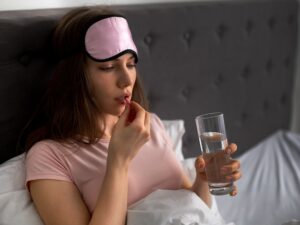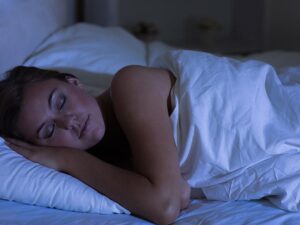A Potential Problem with Sleeping Pills
Sleep! We all need it. Many of us don’t get enough of it. And some of us take pills to improve the quality and length of it.
But what if taking a pill made your sleep less impactful and, even worse, blocked your brain’s critical overnight cleaning cycle. Each night, our brains execute a “wash and rinse” routine that clears away harmful protein waste linked to neurovegetative disease like Alzheimer’s. Now, research shows a common prescription sleep aid can disrupt this essential process.
As the brain transitions from wakefulness to sleep, processing of external information diminishes while the brain activates restorative processes, such as the removal of waste products.
A study published in January 2025 in the journal Cell sought to understand the processes involved in clearing waste from the brain. They found that during a phase of sleep when the brain is relatively calm, known as non-REM sleep, the neurotransmitter norepinephrine was released in slow waves, which caused the blood vessels of the brain to constrict in a rhythmic fashion. These constrictions pump cerebrospinal fluid through the brain in a way that removes waste.
Once this waste removal system was understood, the authors of the study decided to look at how the popular sleep aid Ambien, or zolpidem, might affect it. After administering it to mice, they found that Ambien blocked the waves of norepinephrine that are normally released, which disrupted the removal of waste. This means that the drug could prevent norepinephrine from clearing away toxic waste products like tau and amyloid. And we know from other research that the accumulation of these proteins in the brain is a hallmark of neurodegenerative diseases like Alzheimer’s.

The researchers in the study commented that, as they expected, the mice fell asleep very quickly when given Ambien. They also observed that slow fluctuations in norepinephrine, blood volume, and cerebrospinal fluid almost completely stopped. No fluctuations meant the system didn’t remove any waste.
So, all this time we’ve been thinking that sleeping pills were helping us, but maybe not. This research tells us the pills help us sleep, but they could be removing some of the regenerative benefits of sleep.
There’s an overwhelming amount of research pointing to the fact that most of us need around seven hours of sleep to be healthy, wake up feeling rested, and have the focus and drive to make it through the day. I firmly believe that the increased focus you get from being well rested is far more beneficial to your productivity than burning the midnight oil.
But how do you get sleep when you just can’t sleep? Let’s look at some simple tips that might help you get more sleep without sleeping pills.
Wake Up at the Same Time Every Day
Jerry Siegel, a scientist at the UCLA Center for Sleep Research, says, “The simplest approach to setting a good sleep pattern is to wake up at the same time each day.”
Waking up at the same time allows your body to tell you how much sleep you need. Start going to bed at a time that will give you about seven hours of sleep. If you feel sleepy before then, go to bed earlier. Get yourself into the habit of going to bed early enough that you wake up feeling rested and ready for your day.
You know this is working well when you wake up before your alarm goes off. But it’s also important that you don’t get out bed until the alarm goes off. Use a real alarm, not the alarm on your phone. Don’t even put the phone by your bed so you won’t be tempted to start doomscrolling in the middle of the night when you can’t sleep.
Make Your Room Cold
Humans are designed to sleep outside where the temperature at night is considerably cooler than it is during the day. We are adapted to know that a falling temperature is a cue to fall asleep.
Most mammals are programmed for behaviors like nest building or curling up when our core temperature declines as a way of preparing for sleep. This process of getting warm is a key component in improving your sleep. If you have trouble falling asleep, turn the thermostat down before you go to bed. Start at 68 degrees and go down from there. Going too cold could actually keep you from sleeping well, so take your time to figure out what works best for you. My optimal sleep temperature is 67 degrees.
Don’t Drink Caffeine After Noon
Caffeine has a half-life of 2 to 5 hours. Half-life is the amount of time it takes the body to reduce the concentration of a drug by half. The average 8 oz cup of coffee has about 95 mg of caffeine. A caffeine intake of up to 400 mg a day is considered safe. But a Venti coffee from Starbucks is 20 ounces and contains 415 mg of caffeine. If you drink that at 3:00 pm, you’ll still have a significant amount of caffeine in your system when you go to bed. If you drink the same amount before noon, you should be okay.
The average 8 oz cup of tea has about 50 mg of caffeine. I would recommend avoiding tea after lunch as well.
Don’t Eat or Drink Before Bed
Putting anything in your gut before bed will mess with your sleep.
A review of all studies conducted on the impact of alcohol on sleep found that alcohol increases the time it takes you to reach rapid eye movement sleep and causes you to be more restless during the second part of your sleep.
As for eating, don’t consume any food three hours before bed. If you eat before bed, your food won’t fully digest. Lying down impairs digestion, which could give you acid reflux. Digestion also raises your body temperature, which makes it more difficult for you to fall asleep.
Exercise, But Not Before Bed
Analysts at The Sleep Foundation looked at all the studies involving exercise and sleep. They concluded that “people who experience poor sleep are less active than those with healthy sleep cycles. In particular, people with certain sleep disorders are not as likely to exercise during the day.”
We’ve had a lot of new clients tell us they didn’t sleep well before starting our program. After their first workout, almost all of them have told us they slept better for a couple of days. After a few weeks, most of them tell us they sleep better all the time.
Strength training and daily physical activity will improve your sleep. But don’t do it too close to bedtime. A leisurely walk isn’t so bad and could actually relax you before bed. But an intense workout will elevate your core temperature for at least two hours, which will keep you from falling asleep.
Hopefully, some of this advice will help you sleep better and maybe get off those sleeping pills.
Stay Strong,
Bo Railey

